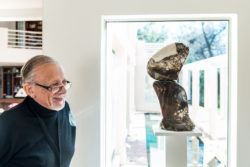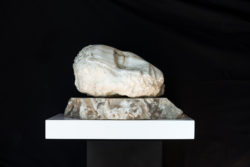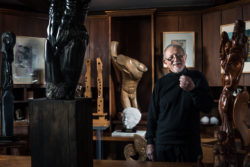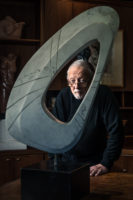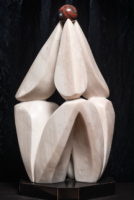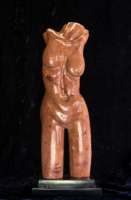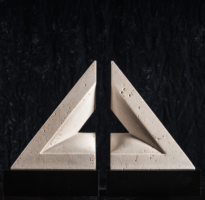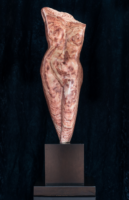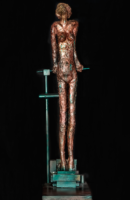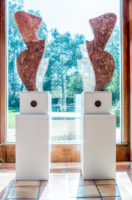Dr. Ralph S. Greco graduated from the Yale University School of Medicine in 1968. He works in Palo Alto, CA and specializes in Surgical Oncology.
Greco is a sculptor of stone as well as a surgeon. His work decorates his home and has sold for as much as $8,500. To see more of Dr Greco’s Sculptures, you can find them printed in our may edition magazine.
1. What are your views on the future of robotic-assisted surgeries in medicine?
I dont see myself as an expert on this. however the current robot is only a better imaging system. together with console controlled laparoscopic instruments. I think with time we will see REAL ROBOTS, EVEN MINIATURIZED ones which can enter the body and do programed work directed by humans.
2. You are actively involved in delivering healthcare in Haiti. In your opinion, How can surgeons working in resource-poor countries take feasible steps to improve the quality of healthcare they provide to their patients?
I first went to Hopital Albert Schweitzer in 1970. I love the country , the people and the art. What is important in resource poor environments is learning to work within the limitations set by the circumstances. The patients are different, their nutrition is different and the diseases that afflict them are different. Learning this and accommodating to it is the best way to improve healthcare. For those willing to make a lifelong commitment to a country, the opportunity to change the healthcare delivery system is enormous.
3. You have a hobby of stone sculpting. Could you tell us more about how you got into stone sculpting.
I am totally committed to sculpture. It is the pursuit of beauty– nothing more–nothing less. At the age of 40, on a whim, I signed up for a sculpture class at the Princeton Art Association. I hated it. I was forced to work in clay and I didn’t like it at all. Two years later I took another class with a sculptor named Lilli Gettinger who had studied with Archipenko. She let me work in stone and I loved it. I studied with her for 5 years and then went out on my own.
4.Would you encourage other surgeons to pursue a creative hobby alongside their professional careers?
It wouldn’t surprise me that many surgeons have creative hobbies. I know of two here that are creative writers. Others may pursue gardening or landscaping. Still others are serious craftsmen, especially woodworkers. In some people, like me, the creative process becomes more serious than just for pleasure. In my case, I have been fortunate to have my work collected by art lovers in many parts of the U. S. I will pursue my art full – time after I retire. It is not for me to recommend to others. But the surgeons I know who have something in their lives like this clearly love it. But there are surgeons who operate every week into their 8th decade and seem to be fulfilled by just surgery.
5. Are there any similarities between sculpting and surgery?
I have been asked this many times. Many people tell me they know a surgeon who is a sculptor or an artist. Certainly it helps to know human anatomy and surgery makes working in 3 dimensions come easily. But sculpture is solitary and stone is hard and cold. Surgery is about people and relationships and flesh is soft and warm.
6.Of all the sculptures you have made, do you have a favourite? and , if so, why?
I have a few sculptures that I like more than most, but no favorite. The sculpture of my father is especially poignant and meaningful.
7.As a director of a support program aimed at encouraging surgeons to live balanced lives, What piece of advice would you give to surgeons who feel stressed with work and who don’t currently live a balanced life.
The Stanford Balance in Life program is unique in all the world. It was created in memory of one of our own residents. He had a fabulous career here from internship until his graduation as a chief resident in June, 2010. He left Stanford to begin a Vascular Surgery Fellowship in Chicago. In November he died, by suicide. In the aftermath, I led a small group of residents and faculty which put together our program, which is exclusively for General Surgery Residents. It was rolled out in July, 2011 and seems to have been very successful, though measuring success in such a venture is problematic. In addition, it is a given that in various walks of life, true ” balance ” is unlikely, though over the course of a lifetime it can be achieved.
8. Should mental health be a greater social concern in the field of medicine? Should all teaching hospitals have a support program?





